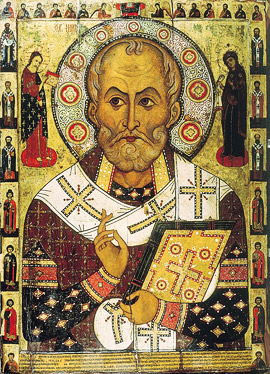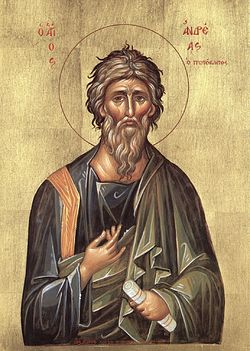Theology
St. Nicholas
20. December 2011 - 12:01 A Dedicated Servant of God
A Dedicated Servant of God
More than 1,600 years ago, in the year 270 AD, St. Nicholas was born not far from Myra, in a land that is now part of the country of Turkey. In those days Orthodox Christians were persecuted for their faith. It wasn't easy to be a Christian. Many of them were tortured and executed because they believed in Christ.
Nicholas was taught by his parents to love the Lord with his whole mind, heart, soul, and with ail his strength. When they died he inherited their money. He used this to help the poor, the hungry, and the sick. Whenever he helped anyone he did it secretly, so that only God would know, He did not want praise from people; he wanted his reward to be only in Heaven.
Homily on the Day of the All-Praised Apostle Andrew the First Called. Man’s true, Eternal Riches
13. December 2011 - 12:33As having nothing, and yet possessing all things. (2 Cor. 6:10)
 Today we celebrate, my beloved, the memory of St. Andrew the First-Called. He has been given that name because he was the first to be called by Jesus Christ to be an Apostle. It happened like this: Soon after the Lord’s baptism by John in the Jordan, John stood on the banks with two of his disciples, John and Andrew; and when he saw Jesus coming, he said, Behold the Lamb of God. Hearing these words from him, both disciples followed after Jesus. When Jesus turned and saw them walking, He said to them, what do you need? They said to Him, “Rabbi,” which means teacher. “Where do you live?” The Lord answered, “Come, and see.” They went and saw where He lived, and stayed with Him that day. It was about the tenth hour, about 4:00 in the afternoon by our reckoning. One of these two who heard about Jesus from John and followed him was Andrew, the brother of Simon Peter. He first found his brother Simon—that is, Peter—and said to him, “We have found the Messiah,” which means, Christ, and led him to Jesus.
Today we celebrate, my beloved, the memory of St. Andrew the First-Called. He has been given that name because he was the first to be called by Jesus Christ to be an Apostle. It happened like this: Soon after the Lord’s baptism by John in the Jordan, John stood on the banks with two of his disciples, John and Andrew; and when he saw Jesus coming, he said, Behold the Lamb of God. Hearing these words from him, both disciples followed after Jesus. When Jesus turned and saw them walking, He said to them, what do you need? They said to Him, “Rabbi,” which means teacher. “Where do you live?” The Lord answered, “Come, and see.” They went and saw where He lived, and stayed with Him that day. It was about the tenth hour, about 4:00 in the afternoon by our reckoning. One of these two who heard about Jesus from John and followed him was Andrew, the brother of Simon Peter. He first found his brother Simon—that is, Peter—and said to him, “We have found the Messiah,” which means, Christ, and led him to Jesus.
Review: John Meyendorff, "Introduction to Byzantine theology" and "Christ in Byzantine theology"
12. December 2011 - 14:55John Meyendorff, Introduction to Byzantine theology, éditions du Cerf, 2010, p. 320, series "Orthodoxy" Christ in Theology Byzantine, éditions du Cerf, 2010, p. 302, series "Orthodoxy." Both books are published in French.
Editions du Cerf commenced with a new collection "Orthodoxy", in which two first books are reprints of two classics of late P. John Meyendorff: Introduction to Byzantine theology and Christ in Byzantine theology.
Bodily Fasting for the Soul’s Benefit
12. December 2011 - 11:37 The Nativity fast begins on November 14/27, and lasts forty days. The Nativity fast is not as strict as Great Lent or the Dormition fast, and can be compared to the Apostle’s fast. It was instituted by the Church so that we would worthily greet the feast of the Nativity of Christ after having cleansed our hearts by prayer and repentance.
The Nativity fast begins on November 14/27, and lasts forty days. The Nativity fast is not as strict as Great Lent or the Dormition fast, and can be compared to the Apostle’s fast. It was instituted by the Church so that we would worthily greet the feast of the Nativity of Christ after having cleansed our hearts by prayer and repentance.
The establishment of the Nativity fast, like many other long fasts, dates back to the early days of Christianity. Already in the fourth century, St. Ambrose of Milan, Philastrius, and Blessed Augustine recall the Nativity fast in their works. St. Leo the Great wrote about the antiquity of the Nativity fast in the fifth century.
Holy Great Martyr Catherine
7. December 2011 - 10:51But before all these, they shall lay their hands on you, and persecute you, delivering you up to the synagogues, and into prisons, being brought before kings and rulers for my name's sake. And it shall turn to you for a testimony. Settle it therefore in your hearts, not to meditate before what ye shall answer: For I will give you a mouth and wisdom, which all your adversaries shall not be able to gainsay nor resist. And ye shall be betrayed both by parents, and brethren, and kinsfolks, and friends; and some of you shall they cause to be put to death. And ye shall be hated of all men for my name's sake. But there shall not an hair of your head perish. In your patience possess ye your souls.
Holy Great Martyr Catherine of Alexandria
7. December 2011 - 10:46![]() The Holy Great Martyr Catherine was the daughter of Constus, the governor of Alexandrian Egypt during the reign of the emperor Maximian (305-313). Living in the capital, the center of Hellenistic knowledge, and possessed of a rare beauty and intellect, Catherine received an excellent education, studying the works of the greatest philosophers and teachers of antiquity. Young men from the most worthy families of the empire sought the hand of the beautiful Catherine, but she was not interested in any of them. She told her parents that she would enter into marriage only with someone who surpassed her in nobility, wealth, comeliness and wisdom.
The Holy Great Martyr Catherine was the daughter of Constus, the governor of Alexandrian Egypt during the reign of the emperor Maximian (305-313). Living in the capital, the center of Hellenistic knowledge, and possessed of a rare beauty and intellect, Catherine received an excellent education, studying the works of the greatest philosophers and teachers of antiquity. Young men from the most worthy families of the empire sought the hand of the beautiful Catherine, but she was not interested in any of them. She told her parents that she would enter into marriage only with someone who surpassed her in nobility, wealth, comeliness and wisdom.

